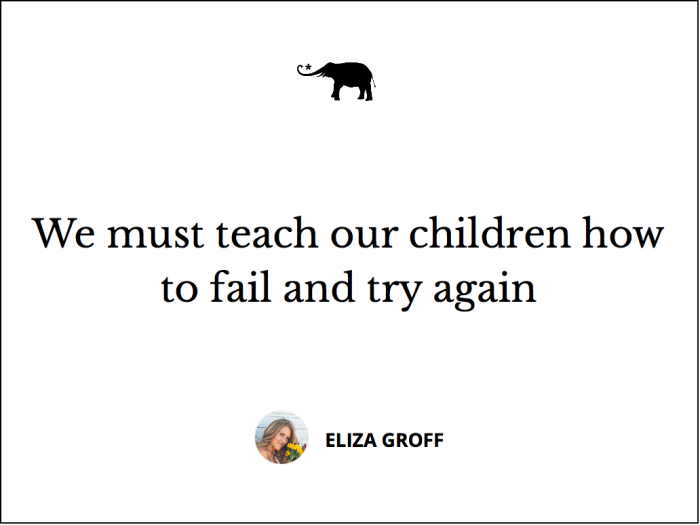11 May 2023
I am a homemaker… A stay at home mother of two children. I homeschool my kids. But I have a dream for the way that our schools should be. I dream of a place that I want my children to be educated, where creativity is the norm, innovation is the standard.
When our current system of public education was implemented, it served our country well. But it no longer does. We live in a world where technology is growing exponentially, information is readily available at every fingertip that can reach the internet. We need to implement educational reform from the ground up and the top down.
I have always been an advocate for “better late than early” when it comes to sending children to school. Much of creativity, social and problem solving skills come from children’s unregulated free play. We live in a world where children are being regulated from an early age, taught to play organized sports, involved in activities from preschool and sometimes earlier in the name of college preparedness… Our children join the achievement rat race from the time they are born and sometimes even before! Mother’s are targeted by large companies because consumerism dominates American society, and every woman wants to have the perfect nursery, adorable clothes, and all of the latest baby technologies.
But what if we could change the way we view our children’s brains? Could we believe that most children are born with a curious mind and a natural capacity to educate themselves? What if instead of plopping our children in front of a television, we explained that boredom is a tremendous gift that gives us the greatest of all human capacities? The ability to be creative for the fun of it.
I believe that we have stolen boredom from our children and teens. We have pressured them into busy lives full of pressure to become educated people, without teaching them why education is important.
Our schools need to have innovation classes, that introduce students to the cutting edge inventions that some of the world’s most creative minds are experimenting with. With the current system of standardized testing, we are teaching our children that failing is not acceptable. What if we taught our children the values of Thomas Edison, one of the greatest inventors who ever lived? “I have not failed. I’ve just found 10,000 ways that won’t work.” – Thomas Edison.
The intent of standardized testing is good – we want all of our children to have competence in basic literacy and numeracy. But, the way that we are trying to implement this value is counterproductive. It is boring our children out of their creativity.
Imagine yourself as a child. What interests did you have? Were you allowed to pursue them? Were you allowed to follow your bliss and follow the tangents of your natural curiosity? I’m 37. In my public education experience, creative teachers were allowed some time to follow tangential questions of students, and often those were the most interesting and valuable lessons that we learned in school. There is no longer time for that with the pressure of standardized testing.
What if we had time to allow our children to explore their natural interests? We can teach them about inventing. Children naturally are interested in the world’s problems and are motivated to find solutions.
Some of our biggest problems as a human society include food waste, water availability and quality, air quality, energy consumption, and availability of natural resources. Great minds are thinking about these problems and proposing solutions, but often not until they reach the engineering department at Yale, MIT, or Cal Berkeley.
I see a future of charter schools that are ingenuity academies. My son is 3, and he is already expressing interest in caring about nature and solving problems. My daughter is 6, and she sees the impact of trash on our oceans and living creatures. Most children do!
We need to be teaching children about the concept of zero waste systems, and trying to minimize the human imprint on the globe, if we want our grandchildren to have a good quality of life.
My family recently took a trip to Las Vegas. Las Vegas is a mesmerizing city, but is facing challenges in terms of water, waste, and energy. But what if instead of trucking vegetables into the city, every nursing home had vertical gardens where senior citizens could maintain gardens that could provide food to local supermarkets? What if the grow technology for indoor marijuana farming was applied to various types of produce? What if we genetically engineered worms or anaerobic bacteria on a massive scale to turn human waste into saleable fertilizer, and reduced the amount of chemicals in water treatment? What if we could use a pipeline fueled by solar pumps from the ocean to the Mojave desert and used parabolic trough solar energy collectors for sea water desalination and use the remaining salt as insulative material for buildings? What if we could capture the methane from cattle farms and use that biodiesel to heat water that could support warm water thriving tilapia, and use that fish waste water as organic fertilizer for vertical farms? What if we could use Wal-Mart rooftops for placement of flower wind turbines that could generate power back into local energy grids?
Transporting energy puts pressure on our power grid, so how do we generate power where it will be used so that it doesn’t have to be transported? Every toilet flushes water, and nearly every household has a flush toilet, so how do we bioengineer cleaner ways of processing waste that don’t use chemicals so that water can quickly become drinking water again? Every plant has a genetic makeup that uses nitrogen and ammonia in various amounts, so if we can decode how much ammonia and how much nitrogen they need we could separate the waste from pigs, chicken, cattle or fish to provide various types of vegetables at their maximum growth rate in vertical farms in cities, reducing the amount the transportation needed from big agriculture farms.
We have to recognize that progress is impeded by politics. Big Farma, Big Ag, and Big Oil all will be losing money if they allow new brilliant ideas and progress to take our country by storm. So, we can try to connect those companies to alternative ways to make money… Like how BP is investing in EV charging stations. Big Ag could help with mass producing worms, like the waxworms that are able to digest plastics. Pharmaceutical companies could help with producing anaerobic bacteria that can digest organic matter (a.k.a. human poop) that can be turned into horticulture products, biogas, and other bioproducts. Oil pipelines could be converted to water transportation systems fueled by solar pumps that can transfer water to parabolic desalination systems in deserts, and the infrastructure can be used to transport water to anywhere in the world that is currently getting oil. Floating solar panels can be used on our reservoirs to reduce evaporation and provide energy for local populations.
Our children need to be educated about the latest innovations surrounding the greatest human needs, and be taught about patents, how to affect their local communities, and be advocates for their interests. This education process shouldn’t start in colleges. This needs to start in kindergarten. A child will learn how to do math, if he sees that there is a relevant application for it. A child will learn how to read, if she sees the need to be able to write a blog. The most rewarding way of learning a new skill is having a goal in mind.
I am trying to learn to play the guitar. I am teaching myself to play, with the intent of being able to sing a song around a campfire. I am motivated to learn the cords to the song that I need in order to sing along to the song. I didn’t start by learning all of the chords or scales to the guitar, and then learn how to play some songs. Children are the same. If they want to learn to ride a horse, they will learn to feed and water the horse, take care of the tack, check the horseshoes, and the parts of the process.
Our schools need to be project based. They need to be collaborative. They needs to focus less on individual achievement and more on teamwork and collaboration. Hard work, determination, creativity, and ingenuity must be rewarded. Our children do not need to be competing to get to the top. They need to be collaborating to get to the top.
Our children in ingenuity academies may end up with learning gaps, but they will become better at finding information, asking for help, and thinking of solutions that will support the future of humanity. Zero waste systems may be a big ask…an unrealistic goal. The way my dad says it, “It’s difficult to get two politicians in the same room to agree on a glass of water.” Our children are going to be facing powerful lobbyists, big pharmaceutical companies, rich and powerful people who will lose profits when progress is made. When it comes down to it, America is capitalist, so making money is going to be important. But our values need to change, if humans are going to thrive on this Earth. We need to change our impact on the environment. We need more efficient ways of recycling natural resources that we have already extracted to reduce our dependency on foreign trade. We need to trust that our children are capable of coming up with creative solutions to change our current and failing systems.
This can be implemented in ingenuity classes in current public schools. This could mean creating charter schools that are focused on student-led learning. Student learning and real-world application shouldn’t wait until an internship at college. By the time our students get to college, they should already know how to publish research, write news articles, post YouTube videos, and find people with like-minded goals.
I have a dream to one day found a university that is student created – student run, student-problem solved, student designed, student-collaborated… a zero-waste university that is totally self-sustaining. Food is produced, water is recycled, waste is treated, and instructors and skills-teachers are hired as needed. The students design the classrooms, the infrastructure, and the living spaces. They source the furnishings… they make the plan for accreditation, and solve the problems that arise in the process. Imagine, if a university student could be part of this undertaking – the skills they would have in the workplace.











Read 0 comments and reply